
Henri Émile Hermand Malherbe, also known as Henry Malherbe or Henry Croisilles (4 February 1886 [1] [n 1] – 17 March 1958) was a French writer. [2]

Henri Émile Hermand Malherbe, also known as Henry Malherbe or Henry Croisilles (4 February 1886 [1] [n 1] – 17 March 1958) was a French writer. [2]
Malherbe was born in Bucharest. [1] In Paris he wrote for Le Temps , [3] the magazine Excelsior, [4] and later for La Revue des vivants, ("organe de la génération de la guerre"), of which he was co-director with Henry de Jouvenel. [5]
Malherbe fought in the First World War. In 1919 he was a co-founder and first president of the Association des écrivains combattants . [n 2] In 1953 the association established the Henry Malherbe Prize for essays in his honour. [2] In 1917 Malherbe won the Prix Goncourt for the novel La flamme au poing, [2] (literally, "The Flame in the Fist", published in English translation in 1918 as The Flame that is France). [7] In 1918 the reviewer in the magazine North American Review wrote:
In The Flame That Is France we have to do with the work of a poet. That M. Malherbe writes in prose does not, of course, alter this fact. His musings over deep things, his fragmentary, intense picturings of action or character, have the meaning of poetry and are expressed in its language. … for his accounts of agony, grief, death, the grappling of the mind with horror – he finds words of bare simplicity. But always in the intensity, the impassioned calmness, of his realizations he is a poet. [8]
Malherbe took a particular interest in musical matters. His interview with Claude Debussy in 1911 is quoted extensively by the composer's biographer Léon Vallas; [9] his criticisms of the Conservatoire de Paris for what he saw as its reactionary agenda and declining standards were reported in Britain and the US, in The Times and by Richard Aldrich, music critic of The New York Times. [10] As a critic, Malherbe was less inclined than some of his colleagues to take new works at face value: he spotted, as many other critics did not, what he called "the heated eroticism" that lay below the seemingly "innocent neoclassical surface" of Francis Poulenc's 1924 ballet Les biches . [11]
In his book about Bizet's Carmen , published in 1951, Malherbe offered what the journal Hommes et mondes called an analysis "of rare lucidity" of the origins, libretto and score of the opera, and presented hitherto unpublished information about the circumstances of the composer's early death; in this Malherbe raised the possibility that unhappy in love and in despair at "the conspiracy of critics who had condemned Carmen", Bizet may not have died of illness but had killed himself. [12]
Malherbe's other books on music attracted some adverse comment from his contemporaries for his propensity to speculate about his subjects. His biography of Schubert (1949) was criticised in Music & Letters for "sketches circumstantially describing scenes for which we have not a shred of evidence. … M. Malherbe allows himself again and again to be carried away by his enthusiasm into writing bookstall fiction." [13] His 1938 Richard Wagner révolutionnaire also suffered from some "rather fictitious" biography, according to the Revue De Musicologie. [14]
Malherbes was appointed a Commandeur de la Légion d'Honneur in April 1953. [2] He died in Paris in 1958, at the age of 72. [1]
Henry Malherbe.
Henry Malherbe.

The Société nationale de musique was an organisation in late 19th and early 20th century Paris, promoting French music and allowing rising composers to present their works in public. It was founded in the aftermath of France's defeat in the Franco-Prussian War of 1870–71 on a strong tide of nationalist feeling, and at first excluded all music by non-French composers. In its first 30 years it gave the premieres of works by composers including Saint-Saëns, Chabrier, Franck, Fauré, Dukas and Debussy.

François Duprat was a French essayist and politician, a founding member of the Front National party and part of the leadership until his assassination in 1978. Duprat was one of the main architects in the introduction of Holocaust denial in France.

Paul Vaillant-Couturier was a French writer and communist. He participated in the founding of the French Communist Party (PCF) in 1920.
Jacques Izoard was a Belgian poet and essayist. He was born Jacques Delmotte at Liège.

Patrick Grainville is a French novelist.
The Prix Marcel Pollitzer, formally the Prix des écrivains combattants Fondation Marcel Pollitzer, is a French literary award created in 1953 by the Association des écrivains combattants. Named for writer Marcel Pollitzer, it is awarded every year to "a work of history and, preferably, to a biography".

The Henry Malherbe Prize is a French literary award created in 1953 by the Association des écrivains combattants. Named for Henry Malherbe, who received the Prix Goncourt in 1917, it is awarded every year for an essay.
Éditions de la Table ronde is a French publishing house founded in 1944 by Roland Laudenbach. Since 1996 it has been an imprint of éditions Gallimard.
Les Nouvelles littéraires was a French literary and artistic newspaper created in October 1922 by the Éditions Larousse. It disappeared in 1985 after having taken the title L'Autre Journal.
Frédéric Jacques Temple was a French poet and writer. His work includes poems, novels, travel stories and essays.
Henri Quittard was a French composer, musicologist and music critic.
Jacques Chailley was a French musicologist and composer.

François Lesure was a French librarian and musicologist.
Fred Goldbeck was a French musicologist and conductor of Dutch origin.
Léon Vallas was a 20th-century French musicologist.
Roger Delage was a French musicologist and conductor. He was the leading authority on the life and works of the composer Emmanuel Chabrier, and as a conductor was known for reviving the music of early French composers such as Guillaume de Machaut.
Tristan Rémy was a French writer and circus historian. He was a proponent of proletarian literature.

Jean Mabire was a French journalist and essayist. A neo-pagan and nordicist, Mabire is known for the regionalist and euronationalist ideas that he developed in both Europe-Action and GRECE, as well as his controversial books on the Waffen-SS.

Léon Pierre Guillaume Moussinac was a French writer, film and art critic, film historian and film theorist.

Houria Bouteldja is a French-Algerian political activist. She served as spokesperson for the Indigènes de la République until 2020.